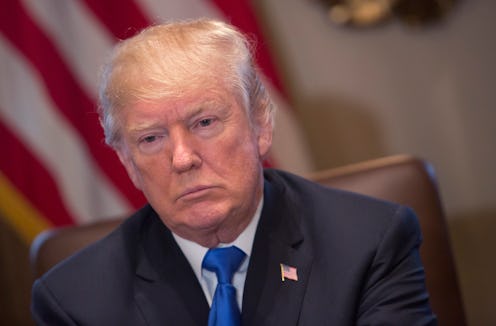News
Why People Are Mercilessly Mocking Trump’s Kwanzaa Message

On Tuesday, President Donald Trump released a statement commemorating Kwanzaa, the seasonal holiday celebrated by many African Americans that begins on Dec. 26 and runs through New Year's Day. But his attitude towards the Pan-African holiday has not always been respectful — to the contrary, Trump once used Kwanzaa to attack Barack Obama, smearing the former president with the false claim that he honored Kwanzaa while refusing to acknowledge the Christmas holiday.
As is often the case, this attack against Obama took place on Trump's Twitter account back in 2011, years before the real estate mogul entered the realm of elected politics. Just days after Christmas, Trump tweeted out a link to an article from a right-wing blog blasting Obama for releasing a Kwanzaa statement. The final line of the post was a quote suggesting that Kwanzaa, like the Seinfeld-inspired Festivus, was a "fake holiday."
Although Trump did mark the start of Kwanzaa via an official statement on Tuesday, he did not mention it on his Twitter, widely considered a more unvarnished, naked glimpse into what's on the president's mind than his official statements.
Today marks the first day of Kwanzaa, a weeklong celebration of African American heritage and culture. Together, let us celebrate during this joyous time the richness of the past and look with hope toward a brighter future.
As families and friends join to light the Kinara, Melania and I extend our warmest wishes for a joyful holiday season and a prosperous year to come.
As multiple news outlets have detailed, Trump's long-running suggestions that his predecessor ― himself an avowed Christian ― was reluctant to speak about Christmas are utterly unfounded. In reality, the White House celebrated seasonal holidays of different faith backgrounds, including Christmas. Obama himself said "Merry Christmas" regularly, sometimes in more than one language.
But nothing seems to stop Trump from advancing his "war on Christmas" rhetoric. Here's the tweet Trump sent back in 2011, attacking his predecessor on implied racial and religious grounds alike.
Earlier in the day, it seemed possible that Trump would be the first president in decades to fail to make note of the Kwanzaa holiday, but that situation, at least, was averted.
Needless to say, the divide between how Trump viewed Kwanzaa back in 2011 ― using it to leverage false attacks against Obama, and tacitly endorsing the idea that it was a "fake holiday" ― and how he's acknowledging it now has stirred up some criticism.
Throughout his presidential campaign, Trump aggressively pushed the notion that political correctness had led Americans to stop saying "Merry Christmas" to each other, and claimed credit this year for "[leading] the charge against the assault of our cherished and beautiful phrase."
There is no evidence for any of this ― to the contrary, Christmas tends to be one of the biggest and most publicly celebrated holidays on the calendar, if not the most.
It remains to be seen whether Trump will mention Kwanzaa in any public appearances, although his press availability has dwindled in recent months. In fact ― pretty hypocritically, given that he repeatedly lambasted his former presidential rival Hillary Clinton for not giving enough press conferences during the 2016 campaign ― its been more than 300 days since he last held a presser.
Despite the Christmas-related tough talk, and in addition to his Hanukkah party earlier this month, this recognition of Kwanzaa means Trump has now marked the three most prominent winter seasonal holidays, just like previous administrations have. In other words, in reality his approach to the holiday season has been pretty conventional and unremarkable.
However, he did violate custom earlier this year, however, by refusing to host a dinner in July for the Muslim holy month of Ramadan.